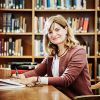
Jessica Sanfilippo-Schulz
- Course: PhD by Distance Learning - English
- PhD title: `
Can you tell us a little bit about your background?
I was born in Liberia (West Africa) and grew up in Liberia, Italy and the UK. For the time being, I have three European nationalities (British –my mother, German – my husband, and Italian – my father). I obtained my BA and MA degrees in Germany (WWU University of Muenster) and my A Levels at a British school in Milano, Italy. In Milano, I met my German husband (a designer) and I moved firstly to Stuttgart and then to Muenster, where we had a daughter and where I then studied as a mature student. During and after my studies, I worked at the WWU as a research assistant.
Why did you choose the University of Leeds?
Having studied for five years at the English department in Muenster, I longed for a breath of fresh academic air. I visited Leeds for the first time last year in March 2018 due to my husband's work reasons. Soon after that a Professor, who is based in America and who I know through my research, incidentally recommended the School of English of the University of Leeds for my PhD Studies.
Yorkshire is a fascinating place, but due to the fact that I have a daughter and my husband has a permanent full-time job in Muenster, I cannot relocate to a new country at this stage in my life. After the recommendation to contact the School of English, I was very pleased to see that the Faculty of Arts, Humanities and Cultures was offering a PhD by distance learning starting in October 2018 for the first time.
What support have you received during your PhD by distance learning?
On top of the ten standard supervisory meetings, I have received extra consultations. Although some of the meetings took place in the offices of my supervisors in Leeds, the majority of the meetings were carried out by Skype. Once a month, my main supervisor reads my work and sends me written comments via email before our Skype meetings. Additionally, the Director of Postgraduate Research of the School of English and his valuable assistant have kept me regularly informed about postgraduate training opportunities and have sent me recaps of the sessions I have been most interested in, but which I could not attend.
Have you had to come to the campus at all?
I visited campus at the start of my PhD for the Year One Induction Week and for the formal enrolment processes. During this week, I immediately received my student ID card so I had access to the libraries, which I visited whilst roaming around the campus. I was then in Leeds again in June 2019 for a week for the transfer assessment and meetings with my supervisors. It was a very rewarding visit.
What has been the most surprising thing about the course?
Generally, I was surprised by the number of illustrious scholars who have worked or are still carrying out innovative work here at the University of Leeds. Not having previously studied in the UK, I was surprised to learn that I would be required to take part in a transfer viva at the end of the year which involved presenting my work and receiving feedback. I think this is beneficial because it encourages researchers to stay focused and carry out significant work during their first crucial PhD year.
Alongside the support I have received from the staff of the University of Leeds during this important first year, I have been surprised by the friendliness and the assistance of the other PhD researchers I met during the induction week. One experienced researcher in particular, who knows the School of English inside out, helped me via email every time I was overwhelmed by not being in Leeds (and thus by being very lost in translation).
How have you benefited from the University facilities despite studying from overseas?
I have benefited from many services offered by the library and IT services. For example, through the Virtual Private Network of the University of Leeds, I have access to many texts which are available Online.
What is it that makes you passionate about your area of study?
Whilst being enrolled in the MA programme ‘National and Transnational Studies’ at the University of Muenster, I stumbled across the sociological term ‘Third Culture Kids’, which refers to individuals who, like myself, grew up in many countries due to their parents’ career choices. I then chose to write my MA thesis on ‘Third Culture Literature’ and on the biographies of contemporary novelists who grew up in many countries. Because I was so passionate about my work and because so few literary scholars are looking into the under-explored topic of migration during childhood and its consequences, I decided to carry on with this research and analyse it in more depth.
What advice would you give to someone considering the PhD by distance learning?
Before embarking on this journey, it is a good idea to contact the Director of Postgraduate Research of the relevant School of study in order to receive detailed information about the distance learning programme. It is important to make sure in advance that communicating and training via modern technology suits both the PhD candidate and the prospective supervisor.

